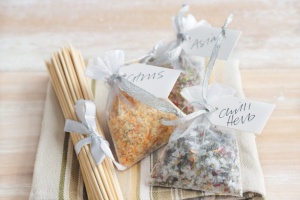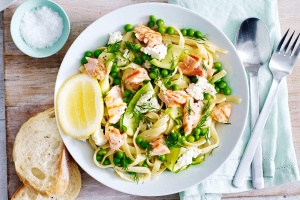Salt shake-up

Photography by Ben Dearnley
Asian sea salt
In this month's issue
 Taste Magazine - December 2014
It's the amazing Curtis Stone issue! Get set for his get-ahead Christmas menu, fresh summer ideas and easy weeknights.
Subscribe
Taste Magazine - December 2014
It's the amazing Curtis Stone issue! Get set for his get-ahead Christmas menu, fresh summer ideas and easy weeknights.
Subscribe
Can't resist a well-seasoned pretzel or bowl of briny olives? Fear not, salt-lovers, nutritionist Kate Skinner adds a pinch of reason with five myth-busting facts.
I'd take smoked salmon over ice cream any day. Olives rarely last the journey home from the deli, yet my own birthday cake was left untouched for over a month (and this year's birthday 'cake' was cheese and cured meats). So, for my fellow sodium-lovers also concerned with health, are the two mutually exclusive?
1) Salt doesn't cause heart disease
We were scared saltless back in the 60s, when a correlation was drawn between salt and high blood pressure. However, half a century on, the arguments for salt reduction are looking decidedly shaky. In fact, it turns out that people who eat the minimum recommended amount of sodium are more at risk of heart disease, anxiety, sleep disorders and muscular dysfunction than those who consume 4000-5900mg daily or 2-3 tsp of actual salt, which is double the recommended upper limit of 2300mg.
2) Salt is hydrating
Salt and water work together to hydrate every cell. We best absorb and retain water with a little salt and sugar in it, which is why saline solution (salt water) plus glucose (sugar) is the remedy for severe dehydration, and why sports drinks are widely used during exercise. A word to the wise for athletes, though - a glass of potassium-rich OJ taken with a pinch of salt is a more nutritious choice and offers the same benefit to your body.
3) Fancy salts aren't better for you
Sea, black, pink, celtic and other 'gourmet' salts contain trace amounts of essential minerals such as potassium, magnesium, zinc and iron, more or less what you might get from chewing a spoonful of dirt. Perhaps a refined palate can detect a subtle hint of volcanic clay, but for those of us who simply enjoy salty food, trace minerals aren't a compelling nutritional motivation to choose one salt over another, unless it's for aesthetic reasons.
4) Salt helps you sleep well & stress less
Salt helps control heart rate and curbs the release of stress hormones, while low-salt diets have been linked to sleep issues, anxiety and even depression. Insomniacs, try the magical combination of warm milk, honey and a pinch of salt before bed, and see if it helps you get some shut-eye.
5) Hidden salts are the bad guys
Cutting salt may decrease blood pressure a modest point or two, but eating enough potassium-rich fresh fruits and vegetables has a far more pronounced effect on overall health. Excessive salt intake comes from eating too many processed foods where salt is hidden, but if you're cooking with fresh produce, you can be confident in seasoning to taste.
Source
Taste Magazine - December 2014 , Page 40
Author
Kate Skinner

















































Latest Comments
Taste.com.au is about sharing your opinions with others.
To make a comment you must be logged in. Log in Register